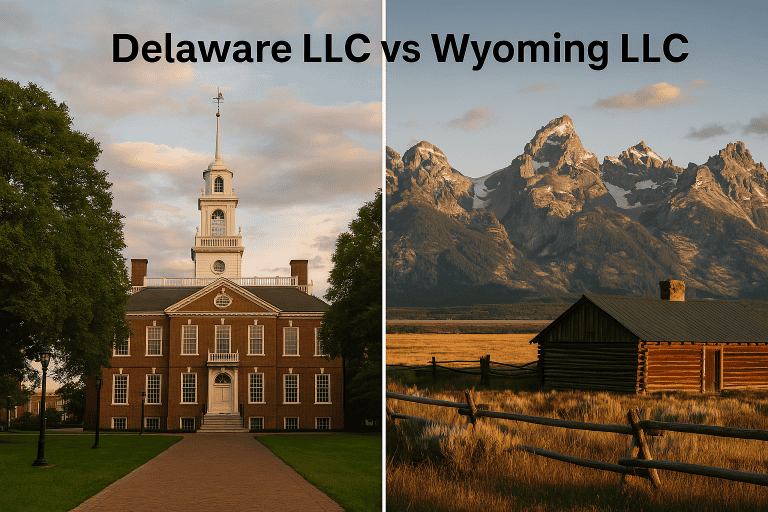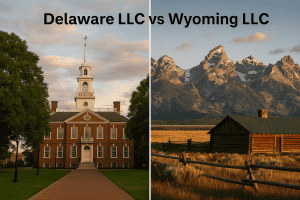Choosing the right state for your LLC is critical. Delaware and Wyoming are two of the most popular options, but they cater to different business needs. Here’s a quick breakdown:
- Delaware: Ideal for larger businesses, especially those seeking venture capital or planning to go public. Known for its specialized business court (Court of Chancery), strong legal framework, and predictable rulings. However, it has higher annual costs and moderate privacy protections.
- Wyoming: Perfect for small businesses and startups prioritizing low costs and privacy. Offers strong anonymity, no state income tax, and minimal annual fees. Its legal system is simpler but less business-focused.
Quick Comparison
| Feature | Delaware | Wyoming |
|---|---|---|
| Formation Fees | Varies | Varies |
| Annual Fees | $300 franchise tax | ~$60 annual report fee |
| Privacy Protections | Moderate | Strong |
| Legal System | Specialized business court (Chancery) | Standard state courts |
| State Taxes | No tax on out-of-state income | No state income tax |
Key Takeaway:
- Choose Delaware for legal expertise and scalability.
- Choose Wyoming for cost savings and privacy.
The rest of the article dives deeper into costs, tax structures, legal systems, and privacy rules to help you make the best decision for your business.
State Business Laws Compared
Delaware and Wyoming each have unique legal frameworks that influence how LLCs are formed and operated.
Court Systems and Legal Process
Delaware’s Court of Chancery specializes in business disputes, offering resolutions without juries. This system provides expertise and predictable decisions. On the other hand, Wyoming relies on its regular state courts, where jury trials are allowed, but the courts are less focused on business-specific cases.
| Legal System Feature | Delaware (Court of Chancery) | Wyoming (Regular State Courts) |
|---|---|---|
| Specialized Business Court | Yes | No |
| Use of Jury Trials | Not applicable | Available |
| Business Case Law | Well-established | Limited |
These differences in legal systems highlight how the states cater to businesses with varying needs.
Owner Privacy Rules
Privacy is another area where these states differ. Wyoming requires very little ownership disclosure, offering greater anonymity for business owners. In contrast, Delaware mandates the disclosure of communication contacts and registered agent details, making it less private.
Business Regulations
The regulatory requirements also set these states apart. Delaware LLCs are subject to a $300 annual franchise tax and benefit from a streamlined filing process with minimal reporting obligations. Wyoming LLCs, on the other hand, pay a $60 annual report fee and follow simple administrative procedures.
Both states offer distinct advantages, catering to businesses with different priorities in governance, legal processes, and privacy preferences.
Tax Structure Differences
Understanding the tax rules in Delaware and Wyoming can help you determine which state aligns better with your LLC structure and compliance needs.
State Income Tax Rules
Wyoming does not impose a state income tax. Delaware, on the other hand, generally exempts pass-through LLC income from state taxes. However, LLCs taxed as corporations are subject to a rate of about 8.7%.
| Tax Feature | Delaware | Wyoming |
|---|---|---|
| State Income Tax | Not applied to pass-through LLCs; ~8.7% for LLCs taxed as corporations. | No state income tax |
| Pass-through Taxation | Yes | Yes |
| Sales Tax | None | Yes – base rate ~4% |
| Franchise Tax | $300 minimum annual fee | None |
Let’s also look at the annual tax and filing requirements for both states.
Annual Tax Obligations
Delaware requires LLCs to pay a $300 franchise tax each year. If the LLC is taxed as a corporation, additional requirements may apply. Wyoming’s system is simpler, requiring an annual report and a small fee of about $50.
Tax Filing Requirements
Delaware LLCs must file their annual franchise tax payment by June 1. LLCs taxed as corporations will need to submit extra documentation. Wyoming LLCs file their annual report on the first day of their anniversary month. Both states offer electronic filing, but Wyoming’s process is more straightforward.
sbb-itb-ba0a4be
LLC Costs by State
When forming an LLC, it’s important to know the costs involved. States like Delaware and Wyoming have specific fees for filing, registered agents, and ongoing maintenance. Business Anywhere simplifies the process, making it easier to manage these costs. Let’s break down the main expenses: formation fees, registered agent fees, and maintenance costs.
Formation Fees
Delaware and Wyoming each have their own filing fees when you go through state agencies. However, Business Anywhere offers LLC formation without charging formation fees, letting you focus your budget on building your business.
Registered Agent Fees
Every LLC needs a registered agent with a physical address in the state of formation. Business Anywhere offers competitive rates for registered agent services across all states, meeting legal requirements without adding unnecessary expenses.
Ongoing Maintenance Costs
LLCs must handle recurring expenses like annual filings, franchise taxes, or licenses, which vary by state. Some states charge higher fees, while others keep costs low. Business Anywhere helps you stay on top of these compliance requirements, making maintenance hassle-free.
Knowing the fee structures in Delaware and Wyoming can help you decide which state fits your business best. Comparing these costs ensures you make an informed choice for your LLC formation.
State Selection Guide
When deciding between Delaware and Wyoming for your LLC, it’s important to weigh formation fees, annual upkeep, and tax filing requirements. These cost factors complement earlier discussions about legal and tax structures.
Cost Efficiency Considerations
Delaware is known for its strong legal framework but comes with higher fees. On the other hand, Wyoming stands out for its lower formation costs, minimal upkeep expenses, and the absence of state corporate or franchise taxes.
Balancing Costs and Needs
Choosing the right state depends on your business priorities. If a strong legal framework is more important than keeping expenses low, Delaware might be the better fit. For those focused on minimizing costs, Wyoming is a practical choice. Services like Business Anywhere can simplify the formation and upkeep process, helping you save time and money. Carefully evaluate these cost factors alongside your business goals to make the best decision for your LLC.
Conclusion
State Comparison Summary
The earlier discussion highlighted key differences in legal frameworks, tax structures, and costs, which come together in this comparison. Delaware stands out for its well-established legal precedents and specialized business court system, making it a preferred choice for larger companies and venture-backed businesses. On the other hand, Wyoming’s strong privacy protections and lower costs make it appealing to small businesses and entrepreneurs looking for asset protection.
| Feature | Delaware LLC | Wyoming LLC |
|---|---|---|
| Formation Fees | Varies | Varies |
| Annual Fees | Higher maintenance costs | Lower maintenance costs |
| Privacy Protections | Moderate | High |
| Legal Framework | Specialized business court system | Conventional state courts |
| State Taxes | No tax on out-of-state income for LLCs | No state corporate income tax |
Final Decision Steps
To decide which state best suits your business needs, consider these key steps:
-
Business Scale and Growth
- Assess the size and growth potential of your business.
- Delaware is ideal for larger companies and those planning for venture capital or public offerings.
- Wyoming is better suited for startups and smaller operations.
-
Privacy Considerations
- Determine how important privacy is for your business.
- Wyoming offers stronger anonymity for members.
- Delaware provides standard privacy protections.
-
Cost Analysis
- Both states have competitive formation fees, but Wyoming’s lower annual costs make it more budget-friendly in the long run.
-
Strategic Goals
- Align your decision with your long-term business objectives.
- Delaware’s corporate laws are advantageous for investor relations.
- Wyoming’s tax advantages and lower fees support private growth.
Select the state that best matches your business priorities and future plans.








